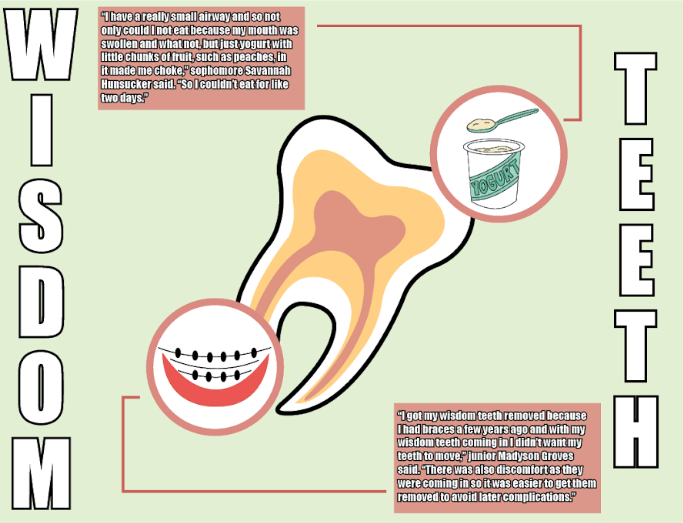Students share wisdom teeth experiences
When someone mentions having their wisdom teeth removed, especially in a crowded room full of teenagers, you are bound to hear a horror story or two about the dreaded procedure. Although wisdom teeth removal is one of the most common procedures with over 10 million wisdom teeth removed in America per year, teens and young adults are often faced with lifelong memories of the experience.
There are many reasons why a person may need to have their wisdom teeth removed such as overcrowding, damage occurring to nearby teeth, and infection or inflammation. Dentists will usually recommend the removal of wisdom teeth in one’s teen years to remove the teeth before the roots are fully formed and make for an easier surgery and recovery. Junior Madyson Groves had her wisdom teeth removed in June 2019 in order to avoid future complications and shifting of her teeth.
“I got my wisdom teeth removed because I had braces a few years ago and with my wisdom teeth coming in I didn’t want my teeth to move,” Groves said. “There was also discomfort as they were coming in so it was easier to get them removed to avoid later complications.”
For Groves, full recovery took about a month. She explains that it takes this long in order for the holes where the wisdom teeth once were to completely heal. Groves said that the removal wasn’t terribly fun and although the surgery “definitely hurts” and caused her face to swell, her experience was not as extravagant as some people have.
“[My removal] went really well. It hurt for a while but I was really lucky, no complications, or anything,” Groves said. “I was back to singing maybe three to five days after the surgery. It was near painless for me.”
According to Westchester Oral Surgery, evidence suggests that when a person under the age of 26 has their wisdom teeth removed, the body will regenerate bone and it is much more likely that there will not be servere issues related to bone loss. Some of the other advantages to having wisdom teeth removed in the teen years are preventing bacterial growth in the hard-to-clean pockets caused by wisdom teeth that may lead to tooth decay, gum disease, and the formation of cysts in the jaw bone. Dr. Kur from the Westchester Oral Surgery says that the risks of not removing wisdom teeth can be substantial and that it is better to be proactive than reactive.
“Getting [my wisdom teeth] out now means I won’t have to do it in the future and or won’t have to get braces again as an adult,” Groves said.
In regards to the actual surgery, many people fear the pain associated with it. However, with the many anesthesia options available this is not something people currently have to worry about. Generally, there are three options available to patients, Local Anesthesia, Nitrous Oxide Sedation and Intravenous Anesthesia. Local Anesthesia is usually just used for simple tooth extractions and the patient remains completely conscious and aware throughout the procedure. With Nitrous Oxide Sedation, commonly known as laughing gas, patients typically remain conscious throughout the procedure. During Intravenous Anesthesia, the patient remains asleep throughout the procedure. Intravenous Anesthesia can be a preferred option for patients with high levels of anxiety prior to the procedure.
“The medicine makes you feel so weird,” Groves said. “After the surgery I don’t remember a few hours but I have videos of me just crying about such stupid things it’s definitely an experience.”
Sophomore Savannah Hunsucker described her wisdom teeth removal surgery as an “out of the box experience.” Hunsucker had her wisdom teeth removed in August 2019 and the surgery was her first surgery in a long time. Once she arrived at the location of her surgery she had an anxiety attack. While preparing for and after the surgery she had complications with a nurse. Hunsucker explained that she ultimately ended up getting an infection because she was not given a syringe to properly clean out her wounds.
“It took me about two to three weeks to fully heal because I had the infection, but the initial swelling went down in about four days,” Hunsucker said.
While returning home from her surgery, the Anesthesia used in Hunsucker’s surgery caused for, in her words, “some very interesting things” to happen. Hunsucker explained that she cried multiple times due to a dog from a nearby car not waving back at her, her mom refusing to take her to Sephora and her mom refusing to take her to McDonalds for a McGriddle. When Hunsucker arrived at home she realized that her throat was very swollen and scratched up and therefore she would not be eating a McGriddle any time soon and even yogurt with small pieces of fruit in it would be hard for her to eat.
“I have a really small airway and so not only could I not eat because my mouth was swollen and what not, but just yogurt with little chunks of fruit, such as peaches, in it made me choke,” Hunsucker said. “So I couldn’t eat for like two days.”
According to one of PubMed.org’s surveys, less than nine percent of wisdom teeth extraction surgeries result in complications. Most people fully recover in three to four days however if the teeth were impacted or grew at an awkward angle it could take up to a week to recover. Overall Wisdom teeth extraction is a very common procedure to fix and or prevent problems.
“For me personally, it was a pretty traumatic experience,” Hunsucker said. “But it benefited me a lot because now I have a lot more room for my teeth to grow since I have a very small mouth but also it just got rid of a lot of the pain I was having.”

